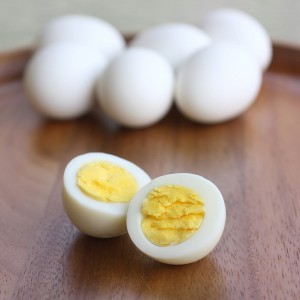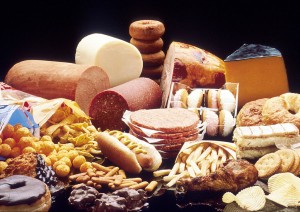 by Anamaria Cretu. With about 70 calories, five grams of fat, six grams of protein, vitamins and minerals galore, and a whopping 185 milligrams of cholesterol inside its shell, the egg really packs a punch [1]! So, what’s the “shell” with eggs? With the ‘incredible egg’ is actually the best way to start the day providing high nutrient contents and overall bodily benefits [1]. However, the word out of every quack’s mouth encourages you to limit egg consumption in your diet to reduce the chances of cardiovascular disease [2, 25, 26, 27]. Let’s break open the shell and let the eggcellent truth spill out for all to realize that eggs are healthy and have little effect on cardiovascular risk [2]. Hear the truth, become a fan and follow Sam because I do like green eggs and ham, and you should like them like Sam I am [20].
by Anamaria Cretu. With about 70 calories, five grams of fat, six grams of protein, vitamins and minerals galore, and a whopping 185 milligrams of cholesterol inside its shell, the egg really packs a punch [1]! So, what’s the “shell” with eggs? With the ‘incredible egg’ is actually the best way to start the day providing high nutrient contents and overall bodily benefits [1]. However, the word out of every quack’s mouth encourages you to limit egg consumption in your diet to reduce the chances of cardiovascular disease [2, 25, 26, 27]. Let’s break open the shell and let the eggcellent truth spill out for all to realize that eggs are healthy and have little effect on cardiovascular risk [2]. Hear the truth, become a fan and follow Sam because I do like green eggs and ham, and you should like them like Sam I am [20].
Although it’s been deemed that an egg a day won’t keep the doctor away since many docs rave about eggs being the cause for cardiovascular disease (CVD) and even heart failure [6]. Yet, eggs are like the shield of armor for a knight, which can fight off the ‘bad’ cholesterol and actually prevent CVD [7]. Much of the claims that eggs in the diet actually increase LDL greater than the high-density lipoprotein (HDL) are really a misrepresentation of the ‘incredible egg’ [19]. When consuming the cracked contents of eggs, it has been shown to elevate this anti-inflammatory and anti-artherogenic agent that may be the reason for fighting off CVD [7]. No doubt, the egg is one mighty superhero for the body.
Are my eyes really seeing the truth that eggs increase HDL and lower LDL cholesterol [7]? Although, doc has told us that eggs are terribly bad for the body, the eye popping nutrients inside the eggs are truly the fountain of youth for the eyes in keeping them healthy [8]. So your mom may not have told you, but eggs are a good source of carotenoids, which are the same things in those vegetables that you avoid eating [8]. The blind side of eggs is within the yolk which contains these carotenoid factors known as lutein and zeaxanthin to basically enhance eye pigmentation for adequate vision [8]. Forget the vegetables and crack open a couple of eggs; they’ll surely do your eyes and body a favor.
When you worry less about cholesterol causing CVD and losing your eye vision, then you’ll love your scale more than ever. Eating eggs truly is the icing on the cake, but without the extra meaningless calories; the great news is that consuming higher cholesterol during a low energy diet promotes a constant weight management [9]. Up till now, docs have been preaching about a diet low in saturated fat and cholesterol by limiting egg consumption [11, 18], but you’re wrong doc because the egg is what it’s cracked up to be. The ‘incredible egg’ can provide the essential amino acids which are those good’ole proteins that make your body big and strong and even make you fit in those skinny jeans[11]. There’s a reason to scramble ourselves some eggs in the morning rather than eating that cardboard cereal that we always indulge in. 
Aren’t we literally the bread consumers of the world? Referring to the actual grains, we have become copy cats believing that having a higher fat diet will result in heart failure [10]. Eggs are loaded with fats [11], however, these aren’t the same fats you get from doughnuts. Folks, there is such a thing as healthy fats. These are known as your omega 3 fatty acids. They are anti-inflammatory agents and may even prevent certain types of cancer and coronary heart disease [12, 13, 23]. This may shock you but eating a couple of eggs a day doesn’t contribute to negative effects on blood lipid results [13, 26]. However, the goodness of fats is nothing like the muscle enhancer of protein inside the shell of the eggs.
Those docs love to drive you to eat all the whole grain carbohydrates because it seems to them to be the way to lower heart failure; however, fellow egg lovers know that those high carbohydrate diets may not be the best way to lose that stubborn fat since our bodies suck up carbohydrates like vacuums [10, 16]. Being satiated from protein seems to be the way to decrease the chances you’d pull up to the drive-thru window at McDonald’s [16]. You may want to join the latest fad of consuming more protein over carbohydrates since it will be the first class ticket for you to get your next Schwarzenegger looking like body and for your young one to grow and be brain smart [14, 15, 16, 22].
All the focus on egg sensitivity and allergies make eggs seem just as bad for your infants and children, right [14]? Wrong, mothers-to- be you need to listen up here; breast milk has shown a failure in providing the adequate amount of iron needed for the infant, so the super egg is here to fix it all [14]. The yolk is really no joke because it contains the needed sources for iron to prevent early onset of deficiencies in infants [14]. Want to hear more? The nutrient rich fats in eggs are considered to also be a sufficient source for infants’ brains for memory and sleep especially in the first months of life [14, 22]. In reality, the effects of eggs on infants and children is virtually irrelevant to adults even though the consumption has been shown to maintain the HDL and LDL levels of cholesterol [14, 15]. We know that eggs are so good for you, so what’s the buzz about eggs causing cancer?
With all eyes on the cancers of the world, it isn’t surprising that eggs have captured the attention as an agent causing ovarian cancer in women [17]. If it was that simple for cells to become cancerous after eating the fats and protein of eggs, then we’d all be walking cancers [24]. The eggciting news about eggs is that they have the same association to cancer as does a piece of red meat [17]. What about the diet and the environment as a factor for the hormone distribution in the body to associate with cancer; everyone loves to blame eggs for everything even though they do more good than bad [17, 24]. Never fear though, super egg is here:-)
The egg really is what it’s cracked up to be! Eggs are truly an ideal source for improving not only overall health but potential risk factors for disease and cancer too [2, 3, 8, 9, 11, 13, 14, 16, 17 ]. Watch out for the super egg because it’s flying in for a landing on your morning plate to provide its goodness for both you and your young one’s body and mind.
About the Author: Anamaria Cretu is an undergraduate student at Nova Southeastern University. Her field of study is Exercise Science.
References
1. Incredible Edible Egg. (2012). Retrieved Oct. 20, 2012. http://www.incredibleegg.org/health-and-nutrition/egg-nutrients/nutrient-label
2. Scrafford, C., Tran, N., Barraj, L., & Mink, P. (2011). Egg consumption and CHD and stroke mortality: a prospective study of US adults. Public Health Nutrition. 14, 261-270 doi:10.1017/S1368980010001874.
3. Nakamura, Y., Iso, H., Kita, Y., Ueshima, H., Okada, K., Konishi, M., . . . Tsugane, S. (2006). Egg consumption, serum total cholesterol concentrations and coronary heart disease incidence: Japan Public Health Center based prospective study. British Journal of Nutrition. 96, 921-928 doi:10.1017/BJN20061937.
4. Djousse, L., Gaziano, M. (2008). Egg Consumption and Cardiovascular Disease and Mortality The Physicians’ Health Study. Am J Clin Nutr, 87(4): 964–969.
5. Houston, D., Ding, J., Lee, J., Garcia, M., Kanaya, A., Tylavsky, F., . . . Kritchevsky, K. (2011). Dietary Fat and Cholesterol and Risk of Cardiovascular Disease in Older Adults: the Health ABC Study. Nutr Metab Cardiovasc Dis. 21(6), 430–437. doi:10.1016/j.numecd.2009.11.007.
6. Djousse, L., Gaziano, M. (2008). Egg Consumption and Risk of Heart Failure in the Physicians’ Health Study. Circulation. 117(4): 512–516. doi:10.1161/CIRCULATIONAHA.107.734210.
7. Klangjareonchai, T., Putadechakum, S., Sritara, P., & Roongpisuthipong, C. (2012). The Effect of Egg Consumption in Hyperlipidemic Subjects during Treatment with Lipid-Lowering Drugs. Journal of Lipids. 1-4. doi:10.1155/2012/672720.
8. Moeller, S., Jacques, P., & Blumberg, J. (2000). The Potential Role of Dietary Xanthophylls in Cataract and Age-Related Macular Degeneration. Journal of the American College of Nutrition. 19(5), 522S–527S.
9. Lacombe, C., Corraze, G., Nibbelink, M., Boulze, D., Douste-Blazy, P., & Camare, R. (1986). Effects of a low energy diet associated with egg supplementation on plasma cholesterol and lipoprotein levels in normal subjects: results of a crossover study. British Journal of Nutrition. 56, 561-575. doi:10.1079/BJN19860137.
10. Nettleton, J., Steffen, L., Loehr, L., Rosamond, W., Folsom, A. (2008). Incident Heart Failure Is Associated with Lower Whole-Grain Intake and Greater High-Fat Dairy and Egg Intake in the Atherosclerosis Risk in Communities (ARIC) Study. J Am Diet Assoc. 108(11), 1881–1887. doi:10.1016/j.jada.2008.08.015.
11. Kummerow, F., Kim, Y., Hull., Pollard, J., Ilinov, P., Dorossiev, D., Valek, J. (1977). The influence of egg consumption on the serum cholesterol level in human subjects. Am J Clin Nutr. 30, 664-673.
12. Endevelt, R., & Shahar, D. (2004). Omega 3: the Vanishing Nutrient beyond Cardiovascular Prevention and Treatment. IMAJ. 6, 235-239.
13. Lewis, N., Seburg, S., & Flanagan, N. (2000). Enriched Eggs as a Source of N-3 Polyunsaturated Fatty Acids for Humans. Poultry Science. 79, 971–974.
14. Makarides, M., Hawkes, J., Neumann, M., & Gibson, R. (2002). Nutritional effect of including egg yolk in the weaning diet of breast-fed and formula-fed infants: a randomized controlled trial. Am J Clin Nutr. 75, 1084-1092.
15. Ballesteros, M., Cabrera, R., Saucedo, M., & Fernandez, M. (2004). Dietary cholesterol does not increase biomarkers for chronic disease in a pediatric population from northern Mexico. Am J Clin Nutr. 80, 855-861.
16. Weigle, D., Breen, P., Matthys, C., Callahan, H., Meeuws, K., Burden, V., & Purnell, J. (2005). A high-protein diet induces sustained reductions in appetite, adlibitum caloric intake, and body weight despite compensatory changes in diurnal plasma leptin and ghrelin concentrations. Am J Clin Nutr. 82, 41– 48.
17. Larsson, S. & Wolk, A. (2005). No Association of Meat, Fish, and Egg Consumption with Ovarian Cancer Risk. Cancer Epidemiol Biomarkers Prev. 14, 1024-1025.
18. Dawber, T., Nickerson, R., Brand, F., & Pool, J. (1982). Eggs, serum cholesterol, and coronary heart disease. Am J Clin Nutr. 36, 617-625.
19. Roberts, S., McMurray, M., & Connor, W. (1981). Does egg feeding (i.e., dietary cholesterol) affect plasma cholesterol levels in humans? The results of a double-blind study. Am J Clin Nutr. 34, 2092-2099.
20. Geisel, T. (1960). Green Eggs and Ham. Retrieved from http://www.mfwi.edu/MFWI/Recordings/Green%20Eggs%20and%20Ham.pdf
21. Spence, J., Jenkins, D., & Davignon, J. (2010). Dietary cholesterol and egg yolks: Not for patients at risk of vascular disease. Can J Cardiol. 26(9), e336-e339.
22. Mitchell, E., Slettenaar, M., Quadt, F., Giesbrecht, T., Kloek, J., Gerhardt, C.,Wiseman, S. (2011). Effect of hydrolysed egg protein on brain tryptophan availability. British Journal of Nutrition. 105, 611-617. doi:10.1017/S0007114510004150.
23. Bautista, L., Herran, O., & Serrano, C. (2001). Effects of palm oil and dietary cholesterol on plasma lipoproteins:results from a dietary crossover trial in free-living subjects. European Journal of Clinical Nutrition. 55, 748-754.
24. Bertone, E., Rosner, B., Hunter, D., Stampfer, M., Speizer, F., Colditz, G.,Hankinson, S. (2002). Dietary Fat Intake and Ovarian Cancer in a Cohort of US Women. American Journal of Epidemiology. 156(1), 22-31. doi: 10.1093/aje/kwf008.
25. Nakamura, Y., Okamura, T., Tamaki, S., Kadowaki, T., Hayakawa, T., Kita, Y., . . . Ueshima, H. (2004). Egg consumption, serum cholesterol, and cause-specific and all-cause mortality: the National Integrated Project for Prospective Observation of Non-communicable Disease and Its Trends in the Aged, 1980. Am J Clin Nutr. 80, 58-63.
26. Njike, V., Faridi, Z., Dutta, S., Gonzalez-Simon, A., & Katz, D. (2010). Daily egg consumption in hyperlipidemic adults -Effects on endothelial function and cardiovascular risk. Nutrition Journal. 9(28), 1-9.
27. Weggemans, R., Zock, P., & Katan, M. (2001). Dietary cholesterol from eggs increases the ratio of total cholesterol to high-density lipoprotein cholesterol in humans: a meta-analysis. Am J Clin Nutr. 73, 885-891.





